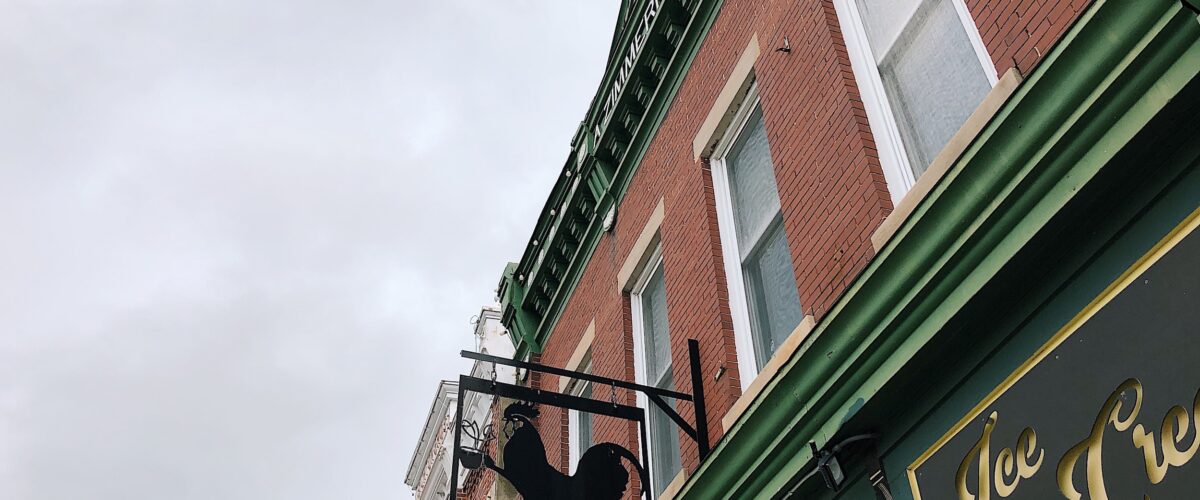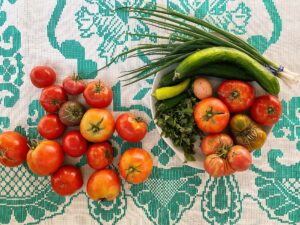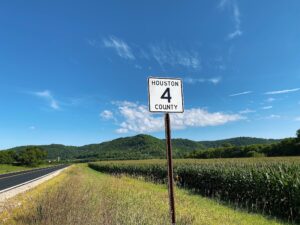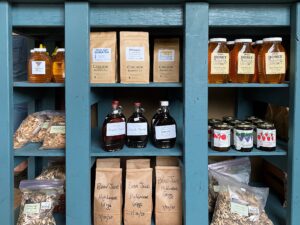This piece is part of a larger project to document the culinary resilience of southeastern Minnesota’s Houston County during the pandemic. You can read more about my Crystal Creek Citizen-Artist Residency project here.
Walking into the Wired Rooster Coffee Shoppe in Caledonia feels like a homecoming, even though I’ve never been here before. It’s a rainy day in the middle of summer, but with inviting artwork, wooden furniture, and twinkle lights, I have no problem imagining the appeal of this place in the dead of winter.
Amanda and Jeremiah Ninneman opened The Wired Rooster in June of 2015 after extensively renovating the A. Zimmerhakl building, built in 1906. In addition to removing the drop ceiling, exposing brick, and redoing the exterior, they pulled up layers of carpet, linoleum, and “who knows what” to get to the original wooden floorboards. Amanda laughs, “We’re just glad there was something under all that!”
Chair-shaped markings are visible on the floorboards, revealing a piece of history from the building’s early days as a barber shop. A framed photograph of the original barber chairs hangs on the wall. There’s even a sandwich named after the original owner: The Zimmerhakl, a panini with ham, salami, pastrami, olives, provolone, and mozzarella on sourdough. I can confirm its salty deliciousness.
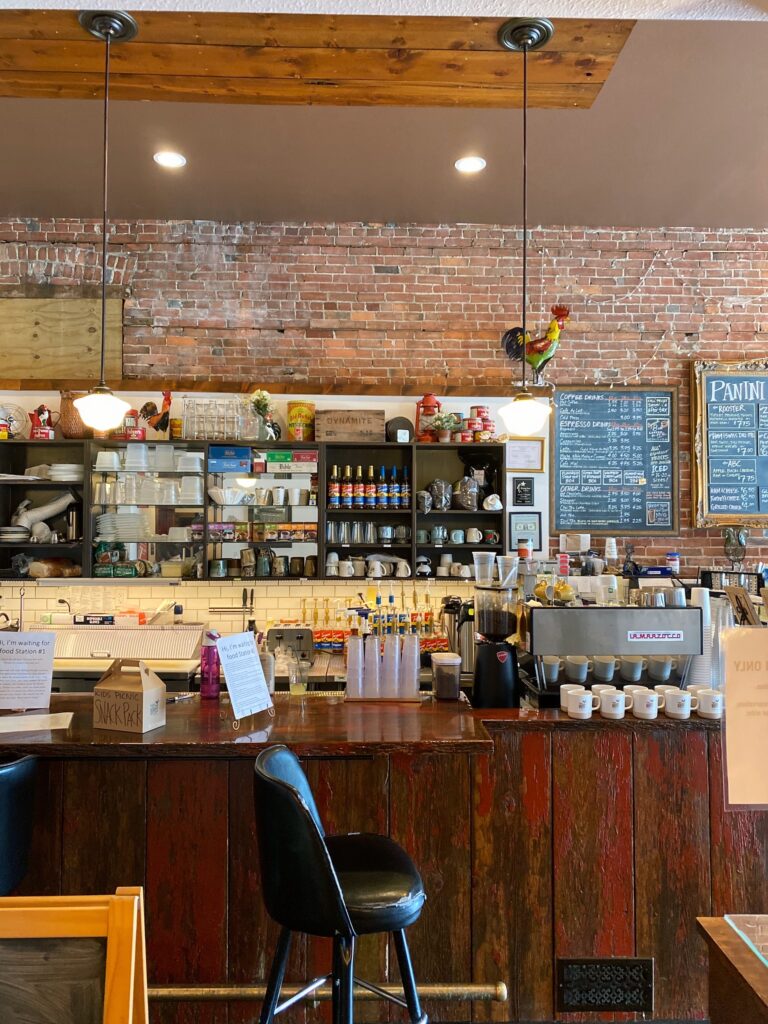
Amanda grew up on a farm outside Caledonia. After attending Luther College and living in New York City, she returned with her family in 2014. “It was a choice,” she tells me. “I wanted to be here.”
Her parents still operate their hobby farm nearby. Amanda’s sister, Melissa Wray, recently moved back to Caledonia and started Mainspring, a nonprofit organization dedicated to arts and culture in Houston County. She lives a couple of blocks from the Wired Rooster. One of their brothers hopes to open a microbrewery across the street. The Wray family is clearly doing their part to boost the culinary and cultural offerings in Caledonia.
The Wired Rooster closed their doors in the early days of the pandemic. “It was very strange,” Amanda says, adding that she missed the hum of life down below from their second floor apartment over the coffee shop. “It was all so unknown. We didn’t want to ask people to come in,” she tells me. Like many small businesses, the couple took the time to work on projects.
The shop reopened on May 4th after being closed for 46 days. New safety measures include waiting stations for takeout, a reduction in table space by half, and removal of most bar stools. A reservation-only model for indoor seating allows them to limit capacity to 50%. Amanda says the community has been supportive, but they still miss a few of their regular customers.
The Wired Rooster is a great place to connect with people. One morning in late July, I meet Jordan Gerard there for an interview. We talk about my project, the Crystal Creek Citizen-Artist Residency, and how Houston County is keeping spirits up despite the pandemic. Jordan tells me it’s been a strange time to work at a newspaper. “COVID-19 brought a lot of stories for us – things we never thought we’d be covering,” she tells me.
Jordan started her job as Editor of the Caledonia Argus in January after two years at the Spring Grove Herald. Shortly into her time at the Argus, focus shifted almost entirely to covering the pandemic.
“This year has really been a roller coaster,” Jordan says as we lower and raise our masks to take sips of our coffees.
Inspired by the pandemic, The Wired Rooster launched a picnic initiative this summer aimed at keeping children excited. These new snack packs encourage customers to fill a picnic tote and take it to the nearby park.
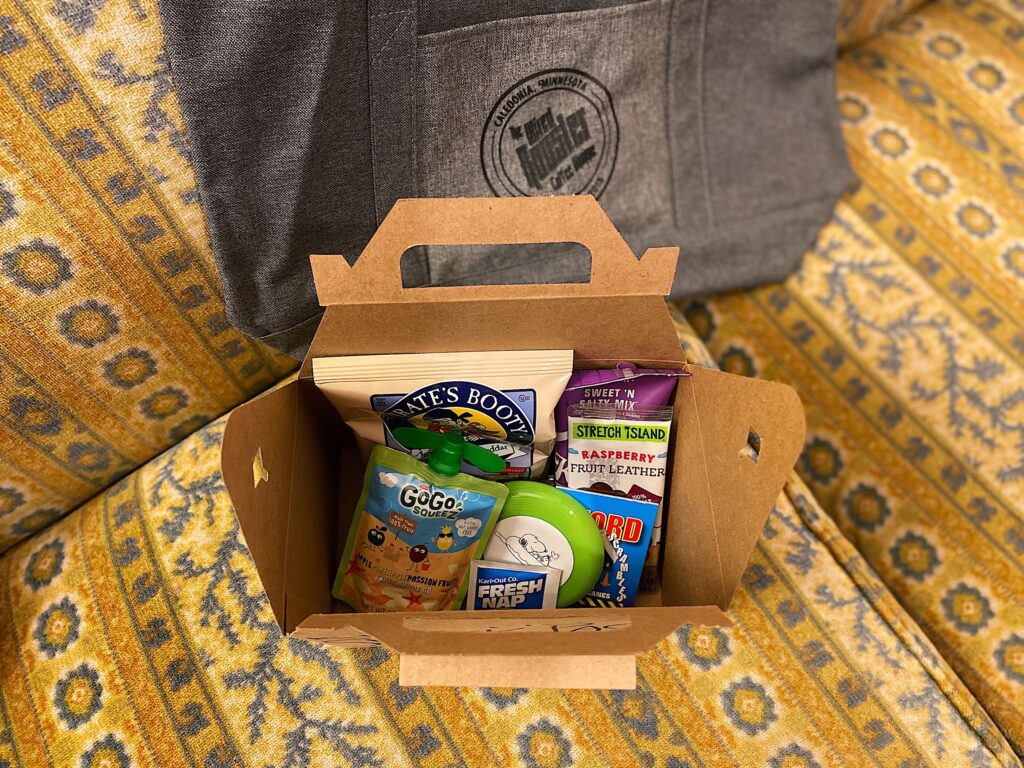
Rural residents could learn from city dwellers when it comes to picnics. Amanda talks about seeing parks in New York City filled with people eating. “The novelty isn’t there in the country,” she says. “We aren’t forced to go to the parks for outdoor time—we have trails and yards and woods to explore.”
In addition to the Wired Rooster, Amanda runs her own graphic design studio. She recently designed the Mainspring Community Cookbook, where she’s an active board member. Amanda is involved with the Caledonia Chamber and just won a Caledonia City Council seat in the November 2020 election.
Like Amanda and Jeremiah at The Wired Rooster, Suzanne Roesler, owner of the Caledonia Bakery across the street, also lives above her shop. “We’re trying to literally take ownership of our Main Street,” Amanda says, mentioning their shared commitment to living and working in the same space and investing in Caledonia’s downtown.
Caledonia’s downtown area is seeing a revitalization. Thanks to a 2018 Small Cities Development Program Grant and CEDA, Caledonia received over $800,000 to renovate commercial, residential, and rental properties. Part of the funding went to the building next to The Wired Rooster, which is in progress at the time of my visit. Allison Wagner, a Caledonia resident, works for CEDA and has been instrumental in the revitalization. She was recently named a Rising Star by the La Crosse Tribune for her work in economic development.
The Caledonia Bakery recently refinished their building’s exterior and sold doughnuts out of The Wired Rooster during construction. These two businesses have a good relationship. Amanda tells me it doesn’t make sense for both of them to sell coffee and pastries. The Wired Rooster sells the coffee and the bakery sells the pastries. Customers are encouraged to bring items back and forth. “Grab a doughnut and sit at the Caledonia Bakery’s patio with your coffee from The Wired Rooster,” Amanda says, “And vice versa!”
The Caledonia Bakery has beautiful windows with painted letters spelling Established in 1923. I stop in one afternoon for doughnuts with no success. The trays are completely empty. “You’ll have to get here much earlier if you want fresh doughnuts,” they tell me. “Well, then, I’ll be back,” I say.
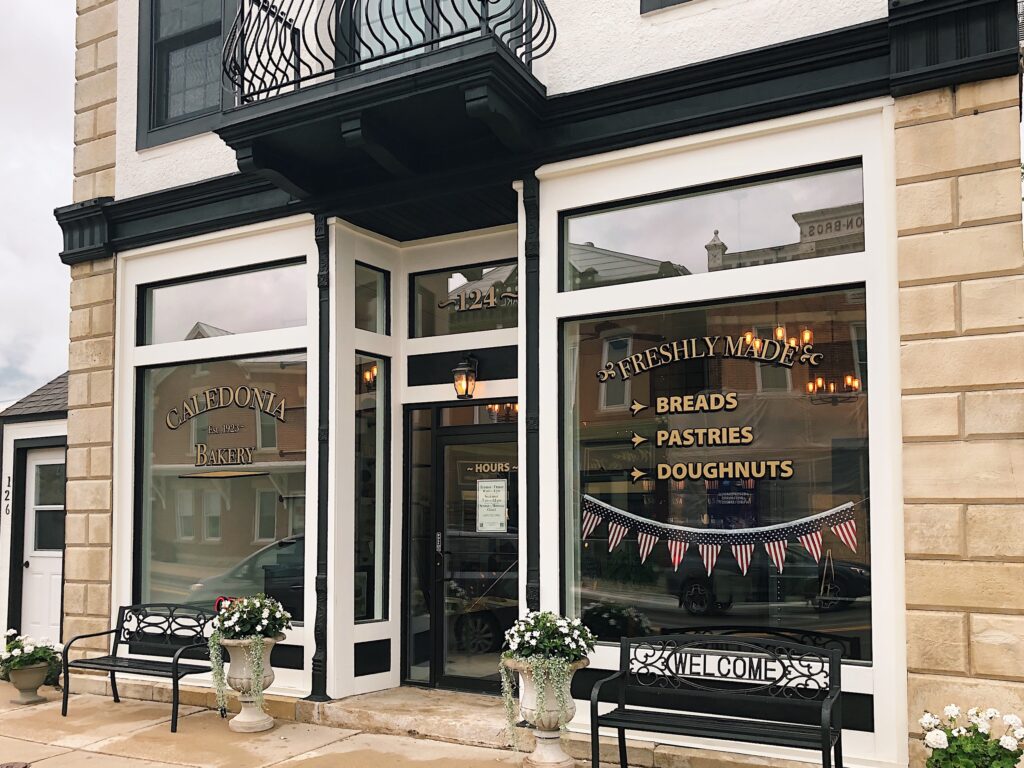
I return a few days later after a night of camping at Beaver Creek Valley State Park. Our morning begins early with the sound of rolling thunder. The car is packed by 6:30am, and as we drive through the campground, we see strangers emerging from their tents to boil water for coffee. Seeing a yawning camper in plaid pajama pants provides a small sense of community, a rarity during pandemic isolation. We bid farewell to our fellow campers and head through the misty valley back to town in search of breakfast.
Since it’s early, we attempt to beat the doughnut rush. We arrive at the Caledonia Bakery in pouring rain to find a socially-distanced line of five men in front of us, just ten minutes into opening. As we wait, a constant stream of pickup trucks pulls up and men emerge to buy doughnuts. All men.
We limit ourselves to just three doughnuts for the two of us: a chocolate cake doughnut with multi-colored sprinkles, a peanut-covered cake doughnut, and a maple long john. We are not at all disappointed with our choices.

As we walk out the door, as if on cue, a white pickup pulls up and an older gentleman and a small boy get out—looks like a grandpa and grandson on doughnut duty.
Venturing down the block to Elsie’s for breakfast, we encounter this same phenomenon: a restaurant full of men, except one woman on a bar stool at the counter and two masked female servers. I count at least 25 men. And that’s not all—our server tells us more men are playing cards in the bar area.
Where are all the women? Then I realize, they’re running the businesses. Elsie Babler is running the kitchen for the morning rush, Suzanne is finishing up the doughnut baking, Allison is likely writing a grant, Jordan is following her next story, Melissa is planning a virtual class, and Amanda is opening the coffee shop.
We pay our bill—two breakfasts, one coffee, one orange juice for $12.50—and give a hearty thanks to all the women keeping Caledonia alive on this dreary morning.

Elisabeth A. Fondell is a writer, potter, and food enthusiast living in the rural Midwest. She is currently working on Food Stories From Houston County, a project documenting stories of culinary resilience in Minnesota’s southeastern-most county through the Crystal Creek Citizen-Artist Residency.
Elisabeth began focusing on place-based food writing after receiving a grant from the Southwest Minnesota Arts Council to create a body of work celebrating the intersection of food and culture. See that exhibit here.

